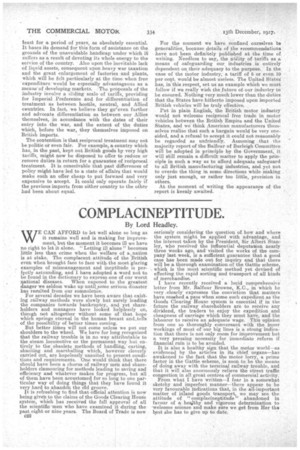COMPLACINEPTITUDE.
Page 2

If you've noticed an error in this article please click here to report it so we can fix it.
By Lord Headley.
WE CAN AFFORD to let well alone so long as it remains well and is making for improvement, but the moment it becomes ill we have no right to let it alone. "Letting ill alone" becomes little less than crime when the welfare of a , nation is at stake. The complacent-attitude of the British eveisi when brought face to face withthe most glaring examples of mismanagement and ineptitude is perfectly astounding, and I have adopted a word not to be found in the dictionary to express one of our worst
national diseases. When exposed to the greatest danger we seldom wake up until some serious disaster has resulted from our somnolence.
For several decades we have been aware that exigt ing railway methods were slowly but surely leading the companies towards bankruptcy, and yet shareholders and managers have looked helplessly on, though not altogether without some of that hope which springs eternal in the human breast and .tells -of the possibility of better times coming. But better times will not come unless we put our shoulders to the wheel. We have for long recognized that the railway trouble is in no way attributable to the steam locomotive or the permanent way but entirely to the obsolete methods of handling, carting, shunting and marshalling which, however cleverly carried out, are hopelessly unsuited to present conditions and requirements. One would think that there should have been a chorus of railway men and shareholders clamouring for methods leading to saving and efficiency and whatever makes for progress, but all of them have been accustomed for so long to one particular way of doing things that they have found it very hard to abandon the old groove.
It is refreshing to find that official attention is now being given to the claims of the Goods Clearing Hous'e system, which has received the full approval of all the scientific -men who have examined it during the pat eight or nine years. The Board of Trade is now seriously considering the question of, how and where the system might be applied with advantage, and the interest taken by the President, Sir Albert Stanley, who received' the influential deputaaion nearly three weeks ago, i and visited the works of the company last week, s a sufficient guarantee that a good case has been made out for inquiry and that there will be a thorough examination of the Gattie scheme, which is the most scientific method yet devised of effecting the rapid sorting and transport of all kinds of merchandise.
I have recently received a lucid comprehensive' letter from Mr. Balfour Browne, K.C., in which he very .clearly expresses the conviction that matters have reached a pass when some such expedient as the Goods Clearing House system is essential if in the future the railway shareholders are to receive any dividend, the traders to enjoy the expedition and cheapness of Carriage which they must have, and the labourer to receive an adequate wage. This opinion from one so thoroughly conversant with the inner workings of most of our big lines is a strong indication that there is not only room for improvement but a very pressing necessity for immediate reform if financial ruin is to be avoided.
It is also a healthy sign that the motor world—as evidenced by the articles in its chief organs—has awakened to the fact that the motor lorry, a prime factor in the Gattie scheme, is soon to be the means of doing away with the terminal railway trouble, and that it will also enormously relieve the street traffic congestion in all great centres of commercial activity. From what I have written—I fear in a somewhat sketchy and imperfect manner—there appear to be very favourable indications that, in the all-important matter of inland goods transport, we may see the attitude of " coniplacineptitude " abandoned in favour of a heajthy and vigorous determination to 'welcome science and make sure we get from Her the laest she has to give up to date.


























